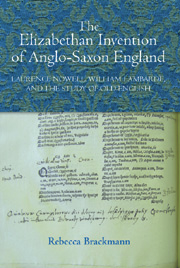 The Elizabethan Invention of Anglo-Saxon England
The Elizabethan Invention of Anglo-Saxon England Published online by Cambridge University Press: 05 February 2013
‘It was invisible, buried in the mud. I only saw it because
I was looking for it.’
‘What! You expected to find it?’
‘I thought it not unlikely.’
A. Conan Doyle, ‘Silver Blaze’
The snapshots of early Anglo-Saxon studies presented in this book allow specialists in both medieval and early modern England to see what can be gained from examining Nowell's and Lambarde's research in the context of their social and professional circumstances. For medievalists, their work shows that Anglo-Saxon studies could speak to issues of language, topography, and the legal system, and were not limited to Anglican polemic; for early modernists, it demonstrates that early nationalistic historical explorations investigated Anglo-Saxon as well as Romano-Celtic history. Laurence Nowell and William Lambarde sought England's heritage in the period of history between the Germanic migrations and the Conquest, and like Sherlock Holmes in the above quotation, they found what they looked for because they looked for it. Stating this does not negate the painstaking, careful research that they conducted, or the laborious process of copying, editing, and cross-checking variant readings that both scholars undertook. It does, however, underscore that if we are to understand the origin of ‘Anglo-Saxon England,’ we must not only look at what it was that Nowell and Lambarde found in their manuscripts, but what they were looking for when they opened them. This interdependency between questions and answers is why my investigation of Old English studies has looked as much at the earliest Anglo-Saxonists' aims as their results.
To save this book to your Kindle, first ensure no-reply@cambridge.org is added to your Approved Personal Document E-mail List under your Personal Document Settings on the Manage Your Content and Devices page of your Amazon account. Then enter the ‘name’ part of your Kindle email address below. Find out more about saving to your Kindle.
Note you can select to save to either the @free.kindle.com or @kindle.com variations. ‘@free.kindle.com’ emails are free but can only be saved to your device when it is connected to wi-fi. ‘@kindle.com’ emails can be delivered even when you are not connected to wi-fi, but note that service fees apply.
Find out more about the Kindle Personal Document Service.
To save content items to your account, please confirm that you agree to abide by our usage policies. If this is the first time you use this feature, you will be asked to authorise Cambridge Core to connect with your account. Find out more about saving content to Dropbox.
To save content items to your account, please confirm that you agree to abide by our usage policies. If this is the first time you use this feature, you will be asked to authorise Cambridge Core to connect with your account. Find out more about saving content to Google Drive.